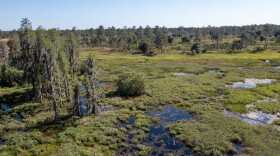-
Gas-powered outdoor equipment releases emissions that pose health risks and contribute to climate change
-
Florida could achieve net zero by 2050 while growing the economy, creating jobs, and reducing the costs of energy and transportation for consumers, according to the report.
-
Carbon credit programs have come under scientific scrutiny for overstating how much they help the climate.
-
Existing coal and new natural gas-fired power plants that run more than 40% of the time will have to eliminate 90% of their carbon dioxide emissions.
-
The governor had vowed, as a former presidential candidate, to replace the words “climate change” with “energy dominance” in national security and foreign policy guidance.
-
Carbon capture pilot project is coming to Hillsborough, despite pushback from clean energy advocatesFor 60 days, a company plans to capture one ton of carbon dioxide daily from the county's waste-to-energy plant, which produces 600 tons of carbon dioxide a day.
-
The state transportation department left $320 million on the table, saying it wouldn’t support the “continued politicization of our roadways.”
-
Florida was offered $320 million in federal funding for transportation projects aimed at reducing tailpipe emissions, but turned it down because of "politicization."
-
"The idea behind using sporopollenin is that now you create a permanent storage for that carbon — that carbon is not going back to the atmosphere," said Matias Kirst with UF.
-
A Q&A with Jason Evans, associate professor of environmental science and studies at Stetson University.
-
Filta technicians visit restaurants, hospitals and stadiums to collect the cooking oil from fryers to be refined into biodiesel, which can help cut down carbon emissions.
-
One of the most common elements in the universe, nitrogen is also a crucial ingredient in fertilizer. All living things need it to survive. But it can kill, too.
Play Live Radio
Next Up:
0:00
0:00
Available On Air Stations












